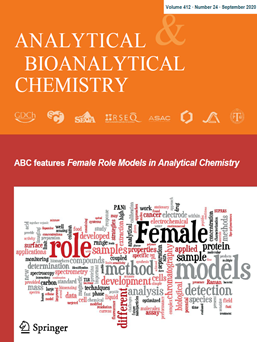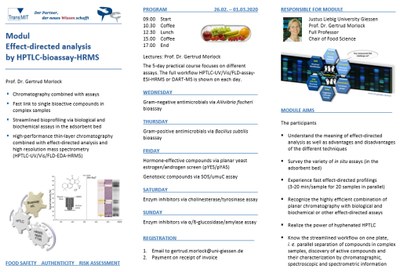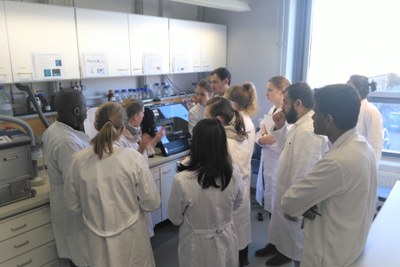News 2020
Es freut uns sehr, wenn unsere Forschung zum Nachdenken anregt! Erkenntnis ist der erste Schritt. Nachfolgend ein Auszug aus Umweltanalytik 2.0 - ein virtuelles Feierabendgespräch:
International research
A special ABC collection on Female role models in analytical chemistry: then, now, and in the future features 60 female researchers from almost 20 countries. Thanks to the selection committee! Our invited contribution was made on Stevia. This was one of the first projects of Julia Heil who performed the experiments. She joined our group in May 2018 and is also an excellent role model!

Auditorrollenspiele in MP 212
Das dritte von 3 Blockmodulen im August mit insgesamt ca. 400 Studierenden: Gut 50 Studierende schauen von zuhause aus zu, wie je zwei freiwillige Studierende die von Herrn Lars Credo geschilderten Unternehmensprozesse auditieren! Dies heißt, eine harte Nuss zu knacken! Im Nachhinein analysiert/kommentiert ganz charmant Herr Otto zusammen mit Herrn Credo den Mitschnitt für die Zuhörer....




Insgesamt haben wir 5 Blockmodule in den sogenannten "Semesterferien" - 2 Praktika kommen noch im September bevor die Vorlesungszeit mit 4 Veranstaltungen startet, um im März erneut mit 3 Blockmodulen in die "Semesterferien" zu gehen. Insgesamt über 1500 Benotungen pro Jahr.
Wie schädlich sind hochverarbeitete Lebensmittel?
hr Alles Wissen, Ernährung, 20:15 vom 06.08.2020
hr Alles Wissen, Ernährung, 20:15 vom 03.08.2020 (wiederverwendet)
Kartoffelpüree aus der Tüte, Suppe aus der Dose: In wenigen Minuten ist eine komplette Mahlzeit zubereitet – zugegeben, Fertiggerichte sind praktisch. Doch sind sie auch gesund? Welche Inhaltsstoffe stecken in hochverarbeiteten Lebensmitteln und wie wirken sie sich auf unseren Körper aus?
Siehe auch Infos zu Frisch, tiefgekühlt oder Konserve – was ist am besten?
hr Alles Wissen, Ernährung, 20:15 vom 28.05.2020
...oder Aluminium in Lebensmitteln: hr Die Ratgeber, 20:00 vom 09.01.2020
JLU students awarded
Two Bachelor students with excellent knowledge on HPTLC were granted by Elke Hahn-Deinstrop, who authored the well-known book on Applied Thin-Layer Chromatography: Best Practice and Avoidance of Mistakes, and Dr. Heinz Hauck, who led the HPTLC research at Merck for more than 3 decades. Here the link to the CBS article.

Awardee Sophie Arnold granted by Elke Hahn-Deinstrop

Awardee Mareike Schenk granted by Dr. Heinz Hauck
Snapshot: daily lunch at due distance





Digital lecturing

Frisch, tiefgekühlt oder Konserve – was ist am besten?
hr Alles Wissen, Ernährung, 20:15 vom 28.05.2020 und 17.12.2020
Lebensmittel gibt es im Supermarkt in unterschiedlichen Angebotsformen, etwa frisch, tiefgekühlt oder in Konserven. Und sie alle haben ihre Vor- und Nachteile, etwa beim Nährstoffgehalt, der Haltbarkeit oder der Ökobilanz. Aber wie unterscheiden sie sich genau? Und was ist am besten?
Siehe auch Infos zu Aluminium in Lebensmitteln gesendet in hr Die Ratgeber am 09.01.2020.
Master and bachelor theses
To cope with all requests - see first our research field here! It depends how many theses we have in the pipeline... unfortunately, we are currently full. Starts are possible first in spring 2021.
Chance for change
After the cyber-attack on the JLU, now the virus attack on the world. Researcher are to a certain extent a kind of more privileged group in this surrealistic disaster, as their brains can stay productive. For me, I can work on the almost 30 papers in the pipeline, which just need to be written/revised. But in particular, it gives us the chance to reflect on our lives and how we will work and interact in future. The world can make something better out of it, if each of us will start her/his own change management!
Transfer of the CBS/CCBS editorship
After 17 years of editing the CBS journal and CCBS database containing more than 11000 abstracts on TLC/HPTLC...
Renewal of the working group
Six PhD candidates graduated within one year! Congratulations to all!
Now we have closed all open calls for a PhD position.
Standardization of nature?
Not every food and food product has to be standardised - this awareness has also to be transferred to the consumer. Make a difference in the approach, if justified. For the latter, communication to the consumer is crucial, as expectations and conditioning on food quality are immanent. Standardization of nature is impossible, or in other words, only to a certain degree that nature allows us.
Finally, the consumer has to make his own change management, e.g., meditation during peeling the smaller curvy carots or potatoes (instead of the ISO/DIN-sized one). Make a difference in your own food shopping to feel the power you have.
With all our senses on the foods
Congratulations to 121 and 84 students who passed both modules on sensory analysis and learned different evaluation methods in 38 exercises to ensure the high quality of our food. In cooperation with the DLG, a certificate was optionally obtained. Sensory experts and industrial experts showing the latest analytical sensory tools were involved. e-Noses, e-tongues, e-ears, e-eyes ... and more e-senses, even when used altogether, these e-tools can not produce results comparably good as a human sensory expert who was made by nature and evolution.

Climate versus smartphone
It pays to act. Operating a smartphone goes far beyond charging the battery. In particular, smartphones are driving a huge boom in internet traffic, and are in the product category with the worst carbon footprint. A decade ago, I decided to live without a smartphone. This seems impossible, as a scientist needs to be connected. It is most difficult to start the own change management, but costs are high if we act too late.
Traveling for presentations withOUT a smartphone seems impossible. Abroad, I asked local people for the route... who then took the smartphone. I experienced that no local person knows the nearest street name anymore. It took us no energy in the past to get this information, but now locals need energy to answer that it is the next street? The next street!
In any case, it is a pleasure to get selfies as reminder from...

Dr. Sayeed Ahmad, Jamia Hamdard University, Delhi

Dr. Ajai Gupta, Indian Institute of Integrative Medicine, Jammu

Dr. Agnes Móricz, Centre for Agricultural Research, Budapest, at HPLC 2019 (conference dinner).
Thanks to many more I received.
Aluminum in food?
On 09.01.2020, a 5-min live interview on aluminum intake was given in the TV serie Die Ratgeber on the hr TV channel in Frankfurt - this was after arriving from Norway, where I held an invited presentation on "State-of-the-art TLC = chromatography in the office".
Previous interviews were in the TV serie Plusminus on the ARD channel or on hr radio...
Back to smoke signals
A paper-free working group having an internal minimalistic server structure for data storage and software systems sounds advanced. However, we sadly had to recognize that we are an excellent worst case scenario of the recent cyber-attack at the JLU. No access to our server system data (as no copy), no instrumental server software, no internet now for 3 months.... thrown back into the last century.
Annotation: After six months, in May, we got back our server structure, but in a limited way only.
Over 100 guest researchers
Besides 30 student theses a year in our group and many collaborative research projects that we perform, we had over 100 guest researchers collaborating on research projects.... there were also many requests for guest researcher stays in 2019. Greatest thanks to Giulia (Italy), Joyce (Kenia), Karuna (India), Petar/Filip/Dusanca (Serbia), Joao (Brasil), Claudia (Germany), Agnes (Hungary), Amira (Tunesia), Jennifer (Germany) ... it was a great joy with you!
Notice that our capacity has already filled up for 2020.
Modul Effect-directed analysis by HPTLC-bioassay-HRMS
Open for externals
Gießen, 26.02.-01.03.2020 Flyer
Featured as image of the iFZ of the month May







